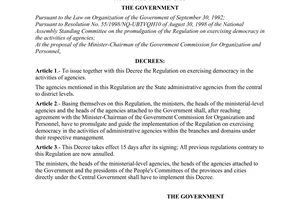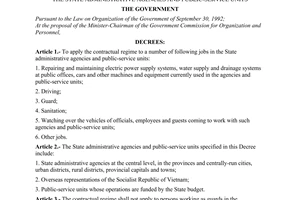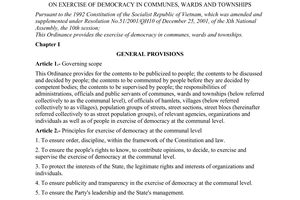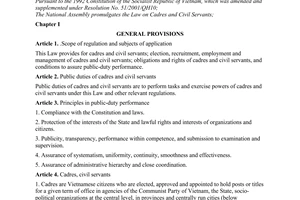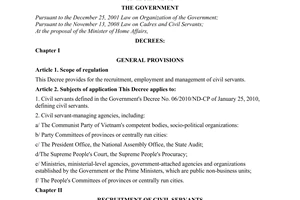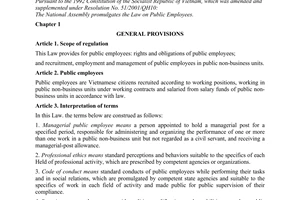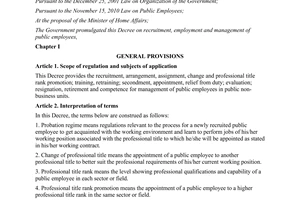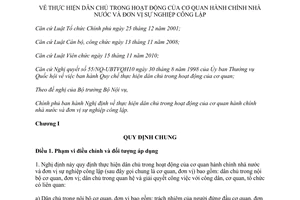Nội dung toàn văn Decree No. 04/2015/ND-CP democracy activities State administrative organs public non business
|
THE GOVERNMENT |
SOCIALIST
REPUBLIC OF VIETNAM |
|
No.: 04/2015/ND-CP |
Hanoi, 09 January 2015 |
DECREE
IMPLEMENTATION OF DEMOCRACY IN ACTIVITIES OF STATE ADMINISTRATIVE ORGANS AND PUBLIC NON-BUSINESS UNITS
Pursuant to the Law on organization of Government dated 25 December 2001;
Pursuant to the Law on cadres and public servant dated 13 November 2008;
Pursuant to the Law on officers dated 15 November 2010;
Pursuant to Resolution No. 55/NQ-UBTVQH10 dated 30 August 1998 of the Standing Committee of National Assembly on issuing Regulation on implementation of democracy in activities of organs.
At the request of the Minister of Home Affairs,
The Government issues the Decree on implementation of democracy in activities of state administrative organs and public non-business units.
Chapter I
GENERAL PROVISIONS
Article 1. Scope of regulation and subjects of application
1. This Decree stipulates the implementation of democracy in activities of state administrative organs and public non-business units (hereafter referred to as organs and units) including: democracy within organs and units, in relation and settlement of affairs with relevant citizens, organs and organizations:
a) Democracy within organs and units includes: responsibility of heads of organs and units and of cadres, public servants and officers in implementation of democracy in internal activities of such organs and units; publicity of affairs for cadres, public servants and officers to know them; cadres, public servants and officers sharing their opinions, decisions of heads of organs; cadres, public servants and officers performing their monitoring and examination;
b) Democracy in relation and settlement of affairs with relevant citizens, organs and organizations includes: responsibility of heads of organs and units and : responsibility of cadres, public servants and officers in relation and settlement of affairs with relevant citizens, organs and organizations; relation between the heads of organs and units with superior organs and inferior organs.
2. This Decree applies to cadres and public servants specified in Article 4 of the Law on cadres and public servants working in state administrative organs from the central to district levels and to officers specified in Article 2 of the Law on officers working in public non-business units and people working under labor contracts specified in Decree No. 68/2000/ND-CP dated 17 November 2000 of the Government on implementation of contract regulation on some types of jobs in state administrative organs and non-business units and named in the payroll and as members of trade unions of organs and units.
The communal-level cadres and public servants who are implementing democracy in activities of their organs as stipulated in the provisions of this Decree and the Ordinance on implementation of democracy in communes and towns.
Article 2. Purposes of implementation of democracy in activities of organs and units
1. Promoting ownership of cadres, public servants and officers and enhancing the responsibility of heads of organs and units.
2. Contributing to build a contigent of cadres, public servants and officers as servants of people with political and ethic quality¸ lifestyle and ability and professional qualifications, working with productivity, quality and efficiency, meeting the requirements of development and innovation in the country.
3. Preventing and controlling acts of corruption, waste, bureaucracy, annoyance and harassment to people.
Article 3. Requirements for implementation of democracy in activities of organs and units
1. Implementation of democracy in activities of organs and units must be associated with leadership assurance of Party organization at organs and units; follow the principles of democratic centralism and promote the role of heads of organs and units and mass organizations of organs and units.
2. Democracy in the framework of Constitution and law; resolutely handling acts of abusing democracy to violate laws, infringe the legitimate rights and interests of cadres, public servants and officers and ownership of people and hinder the duty performance of the organs and units.
Chapter II
DEMOCRACY WITHIN ORGANS AND UNITS
Section 1: RESPONSIBILITY OF HEADS OF ORGANS AND UNITS OF CADRES, PUBLIC SERVANTS AND OFFICERS
Article 4. Responsibility of heads of organs and units
1. Implement democracy in management and operation of organs and units, in management, use, training and retraining and implementation of benefits and policies to the cadres, public servants and officers.
2. Organize periodic, annual, monthly, quarterly and biannual to evaluate the implementation result of assigned tasks and set out essential tasks and solutions to be done in the coming period of organs and units. At the end of year, the heads of organs and units must evaluate the activities of organs and units at the conference of cadres, public servants and officers specified in Article 5 of this Decree.
3. Organize annual evaluation for cadres, public servants and officers under their management in the order and procedures specified in Article 45 of Decree No. 24/2010/ND-CP dated 15 March 2010 of the Government on the recruitment, employment and management of public servants and Article 37 of Decree No. 29/2012/ND-CP dated 12 April 2014 of the Government on the recruitment, employment and management of officers.
4. Listen to the opinions and comments of cadres, public servants and officers and arrange appropriate time to meet and discuss when cadres, public servants and officers register to meet with specific contents.
5. Publicly announce the affairs specified in Article 7 of this Decree to the cadres, public servants and officers for information.
6. Issue regulation on management of working equipment in organs and units to ensure the practicality, effectiveness and economy and economical use of allocated fund and implementation of regulations on financial publicity. The procurement, facilities and other assets of organs and units must follow the regulations of law.
7. Take measures to prevent corruption; handle and create conditions for competent organs and organizations to penalize the persons with acts of corruption or penalize as per regulations of law in case of irresponsibility for corruption occurrence.
8. Direct the timely and adequate supply of information, documents, way of implementation, responsibility for implementation and accountability for contents of work in organs and units specified in Article 7 and 9 of this Decree, except for secret documents as prescribed by law.
9. Review and promptly settle as stipulated by law all complaints, denunciations and recommendations of officials, public servants, officers and people inspection Committee of organs and units; make timely report to the competent authorities on problems beyond their settlement authority.
10. Promptly penalize the persons having acts of hindering the implementation of democracy in activities of organs and units and the persons having acts of revenge or retaliation against complaints, denunciation or recommendations’ cadres, public servants and officers as prescribed by law.
Article 5. Organization of conference of cadres, public servants and officers
1. The heads of organs and units shall coordinate with the trade union of organs and units to organize the conference of cadres, public servants and officers of their organs and units once a year. When there is a requirement from one third of cadres, public servants and officers of organs and units or Executive Board of Union or the heads of organs and units find its necessary to convene the extraordinary conference of cadres, public servants and officers. The participants of conference consist of all or delegates of cadres, public servants and officers of such organs and units.
2. The contents of conference are:
a) Review of implementation of resolutions, guidelines and policies of Party and law of State related to the functions and duties of organs and units; review of implementation of Resolution of previous conference of cadres, public servants and officers and regulations on implementation of democracy in the activities of such organs and units; evaluation, aggregation and review of responsibility of heads of organs and units in implementing the annual working plan; discussion and implementation of working plan for the next year of such organs and units.
b) The heads of organs and units shall listen to the opinions and comments of cadres, public servants and officers and answer questions and recommendations of cadres, public servants and officers.
c) Adoption of internal expenditure Regulation of organs and units; launch of emulation movement and signing of emulation agreement between the heads of organs and units with the union organizations;
d) Discussion of innovative measures of working conditions, improvement of life of cadres, public servants and officers in such organs and units;
dd) Reports of the people inspection Committee of organs and units and selection of people inspection Committee as stipulated by law.
e) Commendation and award to individuals and collective of organs and units with achievements in their work.
Article 6. Responsibility of cadres, public servants and officers
1. Strictly comply with working rules and regulations of organs and units; practice economy, control waste and ensure correct and timely information; comply with regulations on obligations, ethics, communication culture, code of conduct, principles in occupational activities and things which are prohibited by law.
2. Take responsibility before law, direct person in charge and head of organs and units for their duty performance. During work performance, the cadres, public servants and officers may express their opinions and give recommendations to the matters under their scope of responsibility different from the opinions of the direct person in charge, but must follow the direction and instructions of the direct person in charge while reserving their opinions and reporting to the competent authorities. For officers having the right to refuse to perform work or duties in contradiction with regulations of law or decide the professional matters associated with assigned work or duties.
3. Strictly perform criticism and self-criticism and promote advantages and have solutions to correction of shortcomings; give straightforward opinions to build clean and strong organs and units.
4. Contribute opinions to development of documents and plans of organs and units upon requirement.
5. Report to the competent person upon detecting the violations of law in the activities of the organs and units.
Section 2: AFFAIRS TO BE PUBLICIZED TO CADRES, PUBLIC SERVANTS AND OFFICERS FOR INFORMATION
Article 7. Affairs to be publicized
1. Guidelines and policies of Party and law of state related to activities of organs and units.
2. Monthly, quarterly and annual working plan of organs and units.
3. Yearly operational fund, including funds allocated by the state and other financial sources; yearly estimated fund of organs and units; assets and equipment of organs and units and result of audit.
4. Recruitment, training, retraining, assignment, appointment, transfer, secondment, resignation or dismissal; labor contract, change of professional titles or position, termination of labor contract of officers; business trip abroad, benefit settlement, raise of salary scale, salary level, evaluation and classification of cadres, public servants and officers; commendation, discipline, demission or retirement for cadres, public servants and officers; schemes and projects and development of legal normative documents of organs and units.
5. Corruptive and negative cases in organs and units which have been concluded; declaration of assets and incomes of persons obliged to declare in accordance with law.
6. Result of inspection, examination, settlement of complaints and denunciations within organs and units.
7. Rules and regulations of organs and units.
8. Result of opinion receipt of cadres, public servants and officers on matters under the decision authority of the head of organs and units put out for opinions from cadres, public servants and officers specified in Article 9 of this Decree.
9. Directing and operating documents from superior management organs related to the activities of organs and units.
Article 8. Form and time of publicity
1. Form of publicity
Based on the characteristics and nature of activities and contents to be publicized, the organs and units shall apply one, some or all forms of publicity as follows:
a) Listing at the organs and units;
b) Announcement at conference of cadres, public servants and officers of the organs and units;
c) Written notification to all cadres, public servants and officers;
d) Notification to the persons in charge of departments of organs and units for notification to the cadres, public servants and officers working in such departments;
dd) Written notification to the direct executive committee and Executive Board of Union of organs and units;
e) Listing on intranet of organs and units
2. The time limit for publicity is within 03 working days and not exceeding 05 days in special cases after the issuance of documents or receipt of documents from superior organs and units, except for secret documents as prescribed by law. For documents listed at the head office of organs and units, they must be listed at least 30 consecutive days from the listing date.
Section 3: AFFAIRS WITH OPINIONS FROM CADRES, PUBLIC SERVANTS AND OFFICERS AND DECISIONS FROM THE HEAD OF ORGANS AND UNITS
Article 9. Affairs with opinions from cadres, public servants and officers
1. Guidelines and solutions to implementation of resolutions of Party and law of state related to the activities of organs and units.
2. Annual working plan of organs and units.
3. Organization of emulation movement of organs and units.
4. Preliminary and final report of organs and units.
5. Measures to improve the organization, activities and way of working; corruption prevention, economy practice, control of waste, bureaucracy, annoyance and harassment to people.
6. Plan for recruitment, training and retraining to organs and units; selection and appointment of cadres, public servants and officers.
7. Implementation of benefits and policies related to the rights and interests of cadres, public servants and officers.
8. Rules and regulations of organs and units.
Article 10. Forms of opinion contribution
Based on the characteristics and nature of activities and contents of opinion contribution, the organs and units shall apply one of three forms of opinion contribution as follows:
1. Cadres, public servants and officers shall contribute their opinions directly or through their representatives with the heads of organs and units.
2. Through conference of cadres, public servants and officers of organs and units.
3. Giving direct questionaire or sending draft of document for opinion contribution from cadres, public servants and officers;
Section 4: AFFAIRS TO BE MONITORED AND INSPECTED BY CADRES, PUBLIC SERVANTS AND OFFICERS
Article 11. Affairs to be monitored and inspected by cadres, public servants and officers
1. Implementation of guidelines and policies of Party and law of state and annual working plan of organs and units.
2. Use of operational fund, compliance with policies and regulations on management and use of assets of organs and units.
3. Compliance with rules and regulations of organs and units.
4. Compliance with regulations and policies of state on rights and interests of cadres, public servants and officers in organs and units.
5. Settement of complaints and denunciations within organs and units.
Article 12. Forms of monitoring and inspection
The cadres, public servants and officers of organs and units shall carry out their monitoring and inspection through the three following forms:
1. Activities of the people inspection Committee at the organs and units.
2. Review of work, self-criticism and criticism in periodical meetings of organs and units.
3. Conference of cadres, public servants and officers of organs and units.
Chapter III
DEMOCRACY IN RELATION AND SETTLEMENT OF WORK WITH RELEVANT CITIZENS, ORGANS, UNITS AND ORGANIZATIONS
Article 13. Responsibility of the heads of organs and units
1. Organize, direct and inspect the public listing at the head office and posting on website of the organs and units for the citizens, organs and organizations (hereafter referred to as citizen and organization) to know the following information:
a) Department responsible for settlement of relevant work;
b) Administrative procedures for settlement of work;
c) Form of application and dossier for each type of work;
d) Prescribed fees and charges;
dd) Time for settlement of each type of work.
2. Direct and inspect the cadres, public servants and officers in addressing affairs of citizens and organizations; promptly take appropriate measures as prescribed by law to cadres, public servants and officers who fail to complete their duties, lack sense of responsibility, commit harassment, annoyance and corruption in addressing affairs of citizens and organizations;
3. Direct the arrangement of place for citizen reception and implementation of citizen reception and preparation for comment box; direct the persons in charge of administrative work of organs and units and representative of the people inspection Committee of organs and units to open the comment box weekly, study and recommend the addressing to the opinions or suggestion sent, report to the heads of organs and units to put forward rational measures in order to accept and deal with opinions and suggestions.
4. Notify the citizens and organizations at localities to know and contribute their opinions of the programs and projects formulated or implemented by the organs and units in relation to social – economic development of such localities .
5. Appoint persons responsible for meeting and addressing relevant affairs at the request of citizens and organizations as prescribed by law. The suggestions, reports and comments of citizens and organizations must be promptly studied and addressed.
Article 14. Responsibility of cadres, public servants and officers
1. Only receive documents and address affairs of citizens and organizations at the head office of organs and units; protect the secret of state, secret of work and information on the denunciator as prescribed by law.
2. Upon the requirements from the citizens and organizations, the cadres, public servants and officers must address such requirements under their authority and notify the citizens and organizations if beyond their authority and give them instructions to the appropritate competent authorities. The cadres, public servants and officers must not commit the bureaucracy, arrogance, authoritarianism, corruption, annoyance and harassment in addressing affairs of citizens and organizations.
3. The affairs of citizens and organizations must be studied and promptly addressed in accordance with laws and rules and regulations of organs and units.
4. For the affairs with the prescribed time limit for addressing, the cadres, public servants and officers must follow such time limit. In case of complexity which requires more time to study and address, the cadres, public servants and officers must report it to the direct person in charge and promptly notify the citizens and organizations for information.
Article 15. Relation between the heads of organs and units with the superior organs and units
1. Comply with decisions of the superior level. When there are grounds that such decisions are in contradiction with law, report it in writing to the decision maker; if the decision makers still decide the execution, the executor must follow but not take responsibility for the consequences of execution while reporting it to the superior level of such decision maker. The decision makers must take responsibility before law for their decisions.
2. Report the problems and difficulties during the implementation of their functions and duties; give advice to the superior organs and units of unappropriate problems which need to be supplemented or modified in the regulations, policies and regulations of law in direction and operation of the superior organs and units.
3. Contribute their opinions and comments to the activities of superior organs and units; take responsibility for study and contribute opinions to the drafts on regulations, policies and legal normative documents at the request of superior organs and units.
4. Report to the superior organs and units on the prescribed reality of work performance of their organs and units and must report or ask for advice from the superior organs and units for problems beyond their addressing authority. The contents reported to the superior organs and units must be objective and honest.
Article 16. Relation between the heads of organs and units with their inferior organs and units
1. Notify the inferior organs and units of the guidlines and policies of Party and other regulations of law related to the activities and scope of responsibility of inferior organs and units; direct, provide instructions and inspect activities of the inferior organs and units and take responsibility for violations of law of their inferior organs and units if such violations are caused by their directions or instructions.
2. Study and promptly address the recommendations of inferior organs and units; periodically work with the heads of inferior organs and units and must give specific answer to the reception and work when the heads of inferior organs and units register their work with them.
3. In case of necessity, send their cadres, public servants and officers to the inferior organs and units for discussion, study and addressing of specific matters of the inferior organs and units. The cadres, public servants and officers who make untruth or dishonest reports must be strictly penalized.
Chapter IV
IMPLEMENTATION PROVISION
Article 17. Effect
1. This Decree takes effect from 25 February 2015.
2. This Decree supersedes Decree No. 71/1998/ND-CP dated 08 September 1998 of the Government on issuing Regulation on implementation of democracy in activities of organs.
Article 18. Responsibility for implementation
The Minister, Heads of ministerial organs, Heads of governmental organs, Chairmen of People’s Committees of provinces and centrally-run cities and relevant organizations and individuals are liable to execute this Decree./.
|
|
FOR THE
GOVERNMENT |
------------------------------------------------------------------------------------------------------
This translation is made by LawSoft and
for reference purposes only. Its copyright is owned by LawSoft
and protected under Clause 2, Article 14 of the Law on Intellectual Property.Your comments are always welcomed
